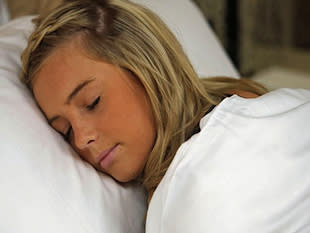 The Sideshow
The SideshowTeen with ‘Sleeping Beauty Syndrome’ wakes up after two months

A British teen suffering from a rare neurological disorder that induces long periods of sleep recently awoke after sleeping for two months.
"I've missed nine exams and my birthday in November," 15-year-old Stacey Comerford tells the Sun. "It's easier now people know what it is. It's easier to explain to them. Before, people didn't believe me. That was the hardest thing."
Comerford suffers from Kleine Levin Syndrome (KLS), also known as Sleeping Beauty Syndrome, a condition affecting only about 1,000 people around the world.
The National Institute of Neurological Disorders and Stroke (NINDS) says Kleine Levin Syndrome affects primarily adolescent males (70 percent) and can often result in an individual sleeping for up to 20 hours at a time. While there is no treatment or cure for the condition, many individuals living with the condition simply outgrow it as they age, usually over the course of 8 to 12 years.
The NINDS describes the symptoms as, "Episode onset is often abrupt, and may be associated with flu-like symptoms. Excessive food intake, irritability, childishness, disorientation, hallucinations, and an abnormally uninhibited sex drive may be observed during episodes."
"There's never any warning. I've even found her fast asleep on the kitchen floor," Comerford's mother, Bernie Richards, tells the Sun. "When she's in an episode, she might get up to go to the toilet or get a drink but she's not awake. I call it sleep mode."
Richards says doctors initially waved off her daughter's symptoms as a result of "moody" behavior.
"I was even investigated by the local education authority because Stacey's school thought I was deliberately keeping her out of school," Richards said. "They've stopped now we've got a diagnosis."
In February, ABC News profiled 21-year-old Eric Haller, who is reduced to a childlike state when his KLS kicks in. Despite experiencing about 8 to 10 episodes per year, Haller still maintains an impressive 3.5 grade point average in college.
"When I go through it, it's complete hell for me," Haller told ABC. "It doesn't feel real and it's hard to understand what people are saying. It's so frustrating, because I want to understand."
And in 2011, fellow Brit teen Louisa Ball made headlines over her struggle with KLS.

